全新版大学英语综合教程2Unit-7PPT课件
全新版大学英语综合教程第二册完整(完整版)ppt课件

.
3
Part II Text A
Howard Gardner, a professor of education at Harvard University, reflects on a visit to China and gives his thoughts on different approaches to learning in China and the West.
LEARNING, CHINESE-STYLE Howard Gardner For a month in the spring of 1987, my wife Ellen and I lived in the bustling eastern Chinese city of Nanjing with our 18-month-old son Benjamin while studying arts education in Chinese kindergartens and elementary schools. But one of the most telling lessons Ellen and I got in the difference between Chinese and American ideas of education came not in the classroom but in the lobby of the Jinling Hotel where we stayed in Nanjing. The key to our room was attached to a large plastic block with the room number on it. When leaving the hotel, a guest was encouraged to turn in the key, either by handing it to an attendant or by dropping it through a slot into a box. Because the key slot was narrow, the key had to be positioned carefully to fit into it.
全新版大学英语2 unit7PPT课件

more previous back index break over
Unit 7: Learning about English
tolerance
NCE-B2
n. followed by of/for
1) 容忍,宽容 2) 忍耐
massive
NCE-B2
a. large in scale, b.amount, or degree
The ancient temple’s massive stone pillars had begun to crumble.
她喝了大量的烈性酒。
She drank a massive amount of alcohol.
Unit 7
Learning about English
Text A The Glorious Messiness of English
Unit 7: Learning about English
NCE-B2
1. The text can be divided into three parts. Now write down the paragraph numbers of each part (Part Two has been done for you) and its main idea:
科学家们呼吁国际社会创立国际准则来禁止克隆人类
Scientists called on the international community to create an international convention to ban human cloning.
全新版大学英语第二版综合教程2unit2的PPT
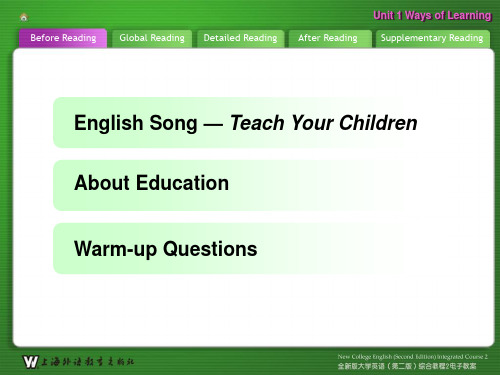
Unit 1 Ways of Learning Unit 1 Ways of Learning
Before Reading Global Reading Detailed Reading After Reading Supplementary Reading
A Survey Do you agree with the following statements? 1. Play is the best way to learn. Detailed Reading 2. Children develop life skills best through formal programs. 3. Children are naturally curious, inspired, motivated learners, but sometimes the enjoyment of learning can get lost in the pressure to “succeed” in formal education. 4. Parents are the most important instructors to the children, so they should give as much guidance as possible.
Unit 1 Ways of Learning Unit 1 Ways of Learning
Before Reading Global Reading Detailed Reading After Reading Supplementary Reading
Introductory Remarks “Ways of learning” is the topic of this unit. It is also Detailed Reading the topic of the song you are about to listen to, called Teach Your Children sung by Crosby, Stills and Nash.
全新版大学英语第二版听说教程2(unit1~7)答案
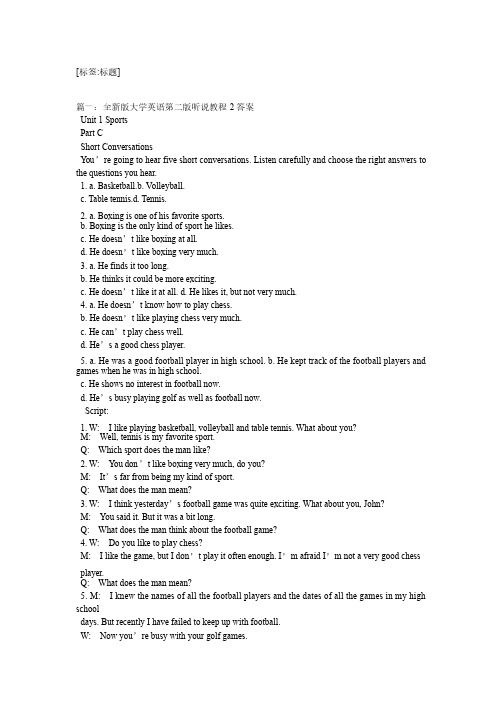
[标签:标题]篇一:全新版大学英语第二版听说教程2答案答案Unit 1 SportsPart CShort ConversationsY ou ’re going to hear five short conversations. Listen carefully and choose the right answers to the questions you hear.1. a. Basketball.b. V 1. a. Basketball.b. Volleyball. olleyball.c. Table tennis.d. Tennis.2. a. Boxing is one of his favorite sports.b. Boxing is the only kind of sport he likes.c. He doesn ’t like boxing at all.d. He doesn ’t like boxing very much.3. a. He finds it too long.b. He thinks it could be more exciting.c. He doesn ’t like it at all.d. He likes it, but not very much.4. a. He doesn ’t know how to play chess.b. He doesn ’t like playing chess very much.c. He can ’t play chess well.d. He ’s a good chess player.5. a. He was a good football player in high school. b. He kept track of the football players and games when he was in high school.c. He shows no interest in football now.d. He ’s busy playing golf as well as football now.Script:1. W: I like playing basketball, volleyball and table tennis. What about you?M: Well, tennis is my favorite sport.Q: Which sport does the man like?2. W: You don ’t like boxing very much, do you?M: It ’s far from being my kind of sport.Q: What does the man mean?3. W: I think yesterday ’s football game was quite exciting. What about you, John?M: You said it. But it was a bit long.Q: What does the man think about the football game?4. W: Do you like to play chess?M: I like the game, but I don ’t play it often enough. I ’m afraid I ’m not a very good chessplayer.Q: What does the man mean?5. M: I knew the names of all the football players and the dates of all the games in my high schooldays. But recently I have failed to keep up with football.W: Now you ’re busy with your golf games.Q: What do you know about the man from the conversation?Unit 2 Food and DrinksPart C Test Your ListeningA ConversationListen to the conversation and choose the right answers to the questions.1. What is the relationship between the two speakers?a. Classmates.b. Co-workers.c. Waiter and diner.d. Strangers.2. Where does the conversation take place?a. At McDonald’s.b. At Kentucky Fried Chicken.c. At an Italian restaurant.d. At Pizza Hut.3. What will they order?a. Pizza, salad and iced water.b. Soup, hamburger and coffee.c. Sandwich, spaghetti and red wine.d. Spaghetti, salad, coffee, Coke and iced water.Script:A: Well, here we are, not too crowded.B: Great! Let’s order quickly so we can chat a little.A: OK. What are you in the mood for?B: Something light. I had a huge breakfast and I’m still full.A: There are three salads. Or you could have soup and a sandwich.B: What are you having? A hamburger, I suppose.A: No, actually I ate out last night. We had pizza at Pizza Hut, then a late snack at Kentucky FriedChicken.B: Oh, dear. Well, maybe you should have a salad.A: Yes, I think so. Look, the daily special is spaghetti. That sounds good.B: Oh, the prices are great too. I’ll have that as well.A: Now let’s decide on drinks.B: I’ll just have coffee and a glass of iced water.A: Italian food needs red wine, you know.B: But we have to go back to work.A: OK, a Coke for me then.B: Here comes the waitress. Let me order first.Unit 3 WeatherPart C Test Your ListeningShort ConversationsY ou’re going to hear five short conversations. Listen carefully and choose the right answers to the questions you hear.1. a. Snowy and windy.b. Cold and rainy.c. Snowy and icy.d. Windy and rainy.2. a. It will get warmer soon. b. It may get even colder.c. This is the coldest winter ever.d. The weather has never been so bad before.3. a. The man is sure the weather will be fine soon.b. According to the forecast the weather will be fine soon.c. If it keeps raining, they will cancel what they have planned to do.d. If it rains hard, they will postpone what they have planned to do.4. a. It’s cold in New York now.b. It’s very hot in New York now.c. The woman thinks New York and Beijing have similar weather.d. The man is going to visit New York.5. a. They’d better change their mind about playing tennis tomorrow.b. They shouldn’t change their plan.c. They can play tennis in the morning.d. They won’t play tennis long.Script:1. W: It’s been freezing for the last few days.M: Y es. And the forecast says there will be more snow next week, accompanied by strong winds. Q: What will the weather be like next week?2. M: We haven’t had such a severe winter for a long time, have we?W: No, and the forecast says it’s going to get worse before it warms up.Q: What can we learn from the conversation?3. W: What if it rains hard? What are we going to do?M: I think it will clear up soon. But if it keeps raining, the whole thing will have to be cancelled. Q: What can we learn from the conversation?4. M: How was the weather when you left New York?W: It was very much like the weather in Beijing. You don’t have to take a lot of clothes. Q: What can we learn from the conversation?5. W: If it is this hot tomorrow, we may have to give up the idea of playing tennis in the afternoon. M: The weather forecast says it will cloud over by noon.Q: What does the man mean?Unit 4 MusicPart CTest Your ListeningA Compound DictationListen to the passage three times and supply the missing information.Celine Dion is the youngest of 14 children in a working-class family in Quebec, Canada. Her parents, who both loved music, 1) encouraged her to develop her musical 2) talent. At 12, Celine had 3) composed the song “It Was Only a Dream”. Her mother and brother helped her to make a recording of that song and sent it off to an address they found on an album of a popular French singer. The address was that of Rene Angelil, who became her first 4) conquest, but there wouldbe millions more.Celine’s rise from a teenage singer to a pop superstar has been 5) steady, but not withoutdifficulties. Record companies were at first less 6) enthusiastic about 7) investing in a teenager than Angelil, who mortgaged his own home to pay for her first album. But her first two albums won a great success. And by 1983 she became the first Canadian ever to have a gold record in France. In 1990, Celine made her first English language record with Unison but 8) her real breakthrough in America came when she was selected by Disney to sing the theme song of Beauty and the Beast. The song went to No.1 on the chart and won both a Grammy and an Academy award. 9) In 1996 she performed at the opening ceremony of the 1996 Atlanta Olympic Games and in 1997 she recorded the theme song for Titanic, and her name became synonymous with the enormously successful film.Celine Dion’s favorite theme is love.10) She sings the depth and the power of love in a great many of her hits such as “Love Can Move Mountains”, “Because You Loved Me”, “The Power of Love” and, of course, the theme song of Titanic, “My Heart Will Go On”.Unit 5 HealthPart C Test Your ListeningShort ConversationsY ou’re going to hear five short conversations. Listen carefully and choose the right answers to the questions you hear.1. a. She feels better today.b. She’ll be OK soon.c. She’s going to see the doctor today.d. She’s not well.2. a. Jack will come back in three weeks. b. Jack is very sick.c. Both the man and the woman miss Jack a lot.d. Both the man and the woman are concerned about Jack’s health.3. a. Eating dinner at very late hours. b. Eating wrong kinds of food.c. Eating too much.d. Eating too little.4. a. He will go to school in a couple of days.b. He is quite all right today.c. He is being treated in hospital.d. He has been ill for a couple of days.5. a. He had an operation last week.b. He needs further treatment in hospital.c. He has had a checkup recently.d. He is going to see the doctor again.Script:1. W: Jane kept coughing and couldn’t go to sleep all night.M: She must be sick. I hope she’s better today.Q:What do you know about Jane?2. M: I haven’t seen Jack for ages.W: Neither have I. But I heard he had been in hospital for three weeks.Q:What do you learn from the conversation?3. W: Doctor, I’ve been suffering from a stomachache for quite a long time.M: Tell me what you usually eat. You know eating properly is very important for health. Q: What does the doctor say about the possible cause of the woman’s illness?4. M: How is your son Peter feeling today?W: Much better than yesterday. But he still needs to rest for a couple of days before going toschool.Q: What does the woman say about Peter?5. M: How is your husband after the operation?W: He’s getting better. But he still needs to go to the hospital for a checkup in a week. Q:What does the woman say about her husband?Unit 6 BusinessPart C Test Your ListeningA PassageListen to the story and choose the right answers to the questions.1. What did Mr. Stevenson’s store sell?a. Family furniture.b. Sports apparatus.c. General appliances.d. Things for newly-weds.2. Why did many newly-weds usually walk away at the end of their inquiry?a. They knew they could buy better-quality appliances elsewhere.b. They were bored with the owner’s long speech.c. They wanted to compare prices at other stores.d. They didn’t think the store could meet their needs.3. Which of the following best describes Mr. Stevenson’s attitude towards his customers? a. Polite and patient. b. Polite but inflexible.c. Generous and kind. d. Snobbish and rude.答案Unit7听说教程篇二:全新版大学英语(第二版)听说教程答案Unit7Part A1.1) Answer: beliefs2) Answer: evidence2.1) Answer: miracle2) Answer: natural3.Answer: evaluating4.1) Answer: intellect2) Answer: reason5.Answer: benefits6.1) Answer: astronomer2) Answer: universe7.1) Answer: philosopher2) Answer: telescope8.1) Answer: astronomy2) Answer: modern science 9.1) Answer: mature2) Answer: judgments10.1) Answer: media2) Answer: misleading data 11.Answer: complex web12.1) Answer: phenomena2) Answer: sort out13.Answer: threat14.1) Answer: imperfect2) Answer: sort of faith15.Answer: spacecraft16.Answer: lunar landing Answer: exploded18.Answer: sixth successful 19.1) Answer: missions2) Answer: hoax20.1) Answer: faked2) Answer: mad21.1) Answer: historical2) Answer: worked22.Answer: few flights23.Answer: samplePart BBACDA1.1) Answer: incredible2) Answer: swirled1) Answer: an hour2) Answer: interviews3) Answer: faked3.1) Answer: discrepancies2) Answer: imagery4.1) Answer: stars2) Answer: lunar5.1) Answer: bending2) Answer: waving3) Answer: breeze6.1) Answer: giant leap for mankind2) Answer: immortalPart CCBBCACBCAPart DFTTTFFTT1.1) Answer: their own work2) Answer: discoveries2.1) Answer: creativity2) Answer: independent thinking 3.1) Answer: confusion2) Answer: science and nonsense 4.1) Answer: magazine2) Answer: newsletter5.1) Answer: an online exhibition area2) Answer: students and young skeptics篇三:全新版大学英语听说教程2答案答案Unit OnePart A1. 172. 19633. 1.984. 2165. 19846. 19867. 30418. third9. 1987 10. 1988 11. four 12. ten 13. 1998 14. six 15. 1990s 16. 45 17. sixth 18. 1998 19. 1999 20. five 21. 1999 22. 2001Part BExercise 11. d2. bExercise 21. Because she wants to enjoy good health. She also wants to stay in shape and look good2. Both Peter and Laura like cycling and swimming. Laura also plays tennis regularlyPart C.1. d2. c3. d4. c5. bUnit TwoPart A.1. Yes2. No3. Yes4. No5. Yes6. No7. No8. NoPart BExercise 1.1. for a while2. plans, this Saturday3. have dinner, weekend4. Italian, too much food5. Chinese, JapaneseExercise 21. It uses natural flavors, not much oil or cream or heavy sauces1. They will have dinner on Saturday at either a Chinese or a JapaneserestaurantPart C1. b2. c3. dUnit ThreePart Ac. cloudy with heavy showers moving in from the west1. a. Fine and pleasant b. 18℃(64℉)℉)2. a. It started around 8 p.m and lasted for about three hoursb. It caused foru deaths and serious damage including a widespread power failurePart BExercise 11. b2. a3. dExercise 21. They went to the department picnic but their fun was spoiled by the hot weather1. Because he thinks it'll only be a short shower that cools things off a little Part C1. a2.b3. c4. d5. bUnit FourPart A.1. However; a2. Because; d3. Firtly; then, finally; c4. In short; bPart B.Exercise 12 4 5 10 12 13 16 17Exercise 21. b2. d3. c4. aPart C1. eouraged2. talent3. composed4. conquest5. steady6. enthusiastic7. investing8. her real breakthrough in America came when she was selected by Disney to sing the theme song of Beauty and the Beast9. In 1996 she performed at the opening ceremony of the 1996 Atlanta Olymic Games10. She sings the depth and the power of love in a great many of her hits such as “Love Can Move Mountains”, “Because You Loved Me”, “The Power of Love”Unit 5Part A1. c2. dPart BExercise 11. d2. d3. c4. dExercise 21. She has suffered from insomnia for several months and lately has had alot of indigestion1. He gave the patient some medicine for insomnia and indigestion. He also advised the patient to have a proper diet and begin a regular exercise program Part C1. d2. b3. b4. a5. dUnit 6Part A1. They are probably business partners1. One is showing the other the buidling where her company has offices1. 2nd 8th 9th 1stintroduction history business marketsPart BExercise 11. They are discussing which candidate is more suitable for a vacant position in the company1. Leader of a group1. Being dynamic1. Because he has no experience in leadership1. Because he has always been a follower, not a leaderExercise 2Loyal, twenty No experience Peterpersonnel management experience Joan Peter and CliveExperienced, solid reliable caustious, dynamic Peter and ClivePart C1. c2. c3. a4. d5. cUnit 7Part Aa medium-sized white T-shirt, a slogan on the front, a shop assistant in getting what he wantsPart BExercise 11. b2. c3. dExercise 21. interesting, handsome, successful, sporty, fashionable, fun1. great, terrible1. the high status group, taste and style, image1. brightens, good, face another day, energy1. high fashion, practical, the image, the realityPart C1. significant 2 relatively 3. concentrate 4. iberal 5. editor 6. ready-to-wear 7. expand8. Vera Wang herself is a very good skater and she had Olympic dreams too9. However, her love for the sport never ceased10. I don't know if designing costumes for Nancy has been good in terms of actual sales, but it has been tremendous for name recognitionUnit 8Part A1. Learn to like yourself1. Self-esteem grows out of achieving realistic goals1. Take occasional days of rest1. Exercise1. Get enoug sleep to feel rested1. Build close relationshipsPart BExercise 11. b2. d3. d4. b5. c6.dExercise 2millions, dream of swimming, one million, receive, $25000 to $40000, twenty, taxes, differentpursue their own interests, home, travel, their children's college education Mosta small number stay on their jobs security opportunities happiness Part C1. c2. b3. d4. dUnit 9Part A1. b2. c3. dPart BExercise 11. c2. b3. aExercise 21. His belief that one day he would become a movie star1. Parking cars for one of Hollywood's big restaurant1. No, his pay was only basic. But he got generous tips from guests drivinginto the restaurant1. Larry parked the car of a famous film director and was able to introducehimself to the man1. a. Many big film companies are interested in meb. Many big companies are pressing me to pay their billsPart C1. b2. d3. b4.aUnit 10Part A1. 1. earthquake2. three days ago3. Turkey4. 100005. 340002. 1. explosion 2. early this morning3. 1084. 385. 11Part BExercise 11. Three months ago2. In the middle of a jungle3. A terrible storm4. All on board the plane except the narrator5. One (the narrator) Exercise 2 1. It rolled and shook in the wind1. No. It arrived nine days later because it was raining heavily and the。
全新版大学英语综合教程2unit7选词填空cloze(中文翻译)
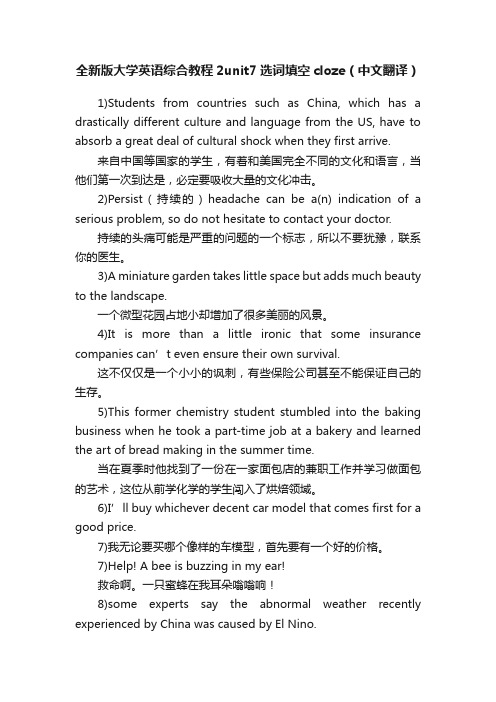
全新版大学英语综合教程2unit7选词填空cloze(中文翻译)1)Students from countries such as China, which has a drastically different culture and language from the US, have to absorb a great deal of cultural shock when they first arrive.来自中国等国家的学生,有着和美国完全不同的文化和语言,当他们第一次到达是,必定要吸收大量的文化冲击。
2)Persist(持续的)headache can be a(n) indication of a serious problem, so do not hesitate to contact your doctor.持续的头痛可能是严重的问题的一个标志,所以不要犹豫,联系你的医生。
3)A miniature garden takes little space but adds much beauty to the landscape.一个微型花园占地小却增加了很多美丽的风景。
4)It is more than a little ironic that some insurance companies can’t even ensure their own survival.这不仅仅是一个小小的讽刺,有些保险公司甚至不能保证自己的生存。
5)This former chemistry student stumbled into the baking business when he took a part-time job at a bakery and learned the art of bread making in the summer time.当在夏季时他找到了一份在一家面包店的兼职工作并学习做面包的艺术,这位从前学化学的学生闯入了烘焙领域。
全新版大学英语综合教程第二版第三册课后习题答案-第七单元
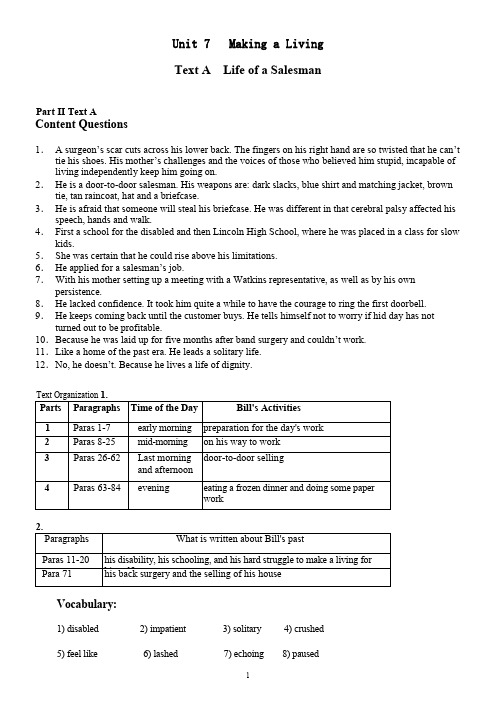
Unit 7 Making a LivingText A Life of a SalesmanPart II Text AContent Questions1.A surgeon’s scar cuts across his lower back. The fingers on his right hand are so twisted that he can’t tie his shoes. His mother’s challenges and the voices of those who believed him stupid, incapable of living independently keep him going on.2.He is a door-to-door salesman. His weapons are: dark slacks, blue shirt and matching jacket, brown tie, tan raincoat, hat and a briefcase.3.He is afraid that someone will steal his briefcase. He was different in that cerebral palsy affected his speech, hands and walk.4.First a school for the disabled and then Lincoln High School, where he was placed in a class for slow kids.5.She was certain that he could rise above his limitations.6.He applied for a salesman’s job.7.With his mother setting up a meeting with a Watkins representative, as well as by his own persistence.8.He lacked confidence. It took him quite a while to have the courage to ring the first doorbell. 9.He keeps coming back until the customer buys. He tells himself not to worry if hid day has not turned out to be profitable.10.Because he was laid up for five months after band surgery and couldn’t work.11.Like a home of the past era. He leads a solitary life.12.No, he doesn’t. Because he lives a life of dignity.Vocabulary:1) disabled 2) impatient 3) solitary 4) crushed5) feel like 6) lashed 7) echoing 8) paused9) betrayed 10) laundry 11) section 12) tilted2.1) cared for 2) hang on3) was laid up with 4) are gaining on5) kicked up 6) went off7) drop ... off 8)straighten out3.1) … sometimes didn't register with her.2)… in disorder, drawers pulled out, shoes and boots scattered.3)… was transferred from Father's account to my account.4)… a pledge to contribute 1000,000dollars to the Children in Needed charity campaign.5)… the most profitable business in that province.4. 1) gaining on; off balance; was laid up in; scar on2) a cripple\ crippled ; surgery , limitations, in literature.3) commission ; on the phone ; his territory ; never registers withII. Usage1.I never did go over these books, although I probably should have.2.I know this is a personal question. You don't have to answer me if you don't want to.3.I think this topic should have attracted far more attention from philosophers than it has.4."I think you're right." — "I'm sure I am."5."He thought that the condition was hereditary in his case." —"Well, it might be."6."Sugar?" ---- "No. Maybe next time."7.The house is only a building. It is a place to live, nothing more.8.DIANE: You didn't! Tell me you didn't! FATHER: Oh, yes.Anything for my children.III. Word Family1.1) bored 2) boredom3) bored 4) boringly5) boring2. 1) encouraged 2) encouragingly3) encouraging 4) encouragement3. 1) frozen 2) freeze3) freezing 4) freezer5) freezeComprehensive ExercisesI Cloze1. Text-related1) off … feet 2) signature 3) commission 4) on the phone5) laid up 6) surgery 7) territory 8) disorder9) applying for 10) dignity2. Theme-related1)didn’t 2) read 3) come 4) money5) because 6) earning 7) doing 8) own 9) obviously 10) valueII. TranslationI. I grew terribly scared when I heard sound of footsteps echoing round the hallway atmidnight yesterday.2. The name-brand sports shoes are guaranteed for 12months.3. Snowstorms threw communications and transportation into disorder.4.I’ve been suffering a lot of stress from work lately, I feel like taking a vacation atthe seaside.5. Living in an apartment is all right, but it has its limitations--- for example, you don’thave your own gardens.6. Tom was born a cripple, with one of his lower limbs useless. Early in his childhood, he learned that unless he so exerted himself as to rise above his limitations, he could not earn a living, and unless he succeeded in making a living on his own, he could not win/gain the respect of others. That was the price he had to pay for his dignity as a human being.Tom applied for numerous jobs, only to be turned down, before he finally got one as a delivery boy for a Pizza Hut. He then worked as a sales representative for a sportswear company in a territory no one else would want. Today he owns a fairly profitable retail shop in his hometown, and hires several people to work for him.Part III TextBComprehension Check1. c 3. a 5. d2. d 4. d 6. bTranslation1.当时我俩并未意识到这一点,但那就是我们之间开始拉开距离的日子,是开始在家庭内部重新界定劳动者的意义的日子。
全新版大学英语综合教程2(第二版)课后标准答案
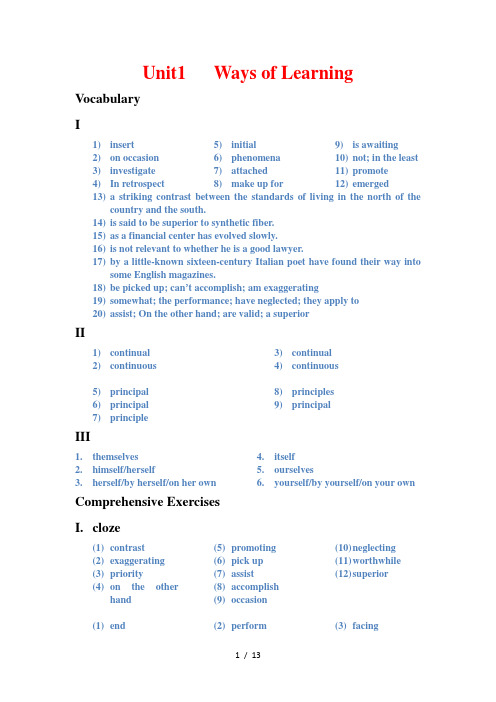
Unit1 Ways of Learning VocabularyI1)insert2)on occasion3)investigate4)In retrospect 5)initial6)phenomena7)attached8)make up for9)is awaiting10)not; in the least11)promote12)emerged13)a striking contrast between the standards of living in the north of thecountry and the south.14)is said to be superior to synthetic fiber.15)as a financial center has evolved slowly.16)is not relevant to whether he is a good lawyer.17)by a little-known sixteen-century Italian poet have found their way intosome English magazines.18)be picked up; can’t accomplish; am exaggerating19)somewhat; the performance; have neglected; they apply to20)assist; On the other hand; are valid; a superiorII1)continual2)continuous 3)continual4)continuous5)principal6)principal7)principle 8)principles9)principalIII1.themselves2.himself/herself3.herself/by herself/on her own4.itself5.ourselves6.yourself/by yourself/on your ownComprehensive Exercises I.cloze(1)contrast(2)exaggerating(3)priority(4)on the otherhand (5)promoting(6)pick up(7)assist(8)accomplish(9)occasion(10)n eglecting(11)w orthwhile(12)s uperior(1)end (2)perform (3)facing(4)competent(5)equipped(6)designed (7)approach(8)rest(9)definitely(10)q ualityII.translation(1)It takes an enormous amount of courage to make a departure from thetradition.(2)Tom used to be very shy, but this time he was bold enough to give aperformance in front of a large audience.(3)Many educators think it desirable to foster the creative spirit in the childat an early age.(4)Assuming this painting really is a masterpiece, do you think it’sworthwhile to buy it?(5)If the data is statistically valid, it will throw light on the problem we areinvestigating.To improve our English, it is critical to do more reading, writing, listening and speaking. Besides, learning by heart as many well-written essays as possible is also very important. Without an enormous store of good English writing in your head you cannot express yourself freely in English. It is also helpful to summarize our experience as we go along, for in so doing, we can figure out which way of learning is more effective and will produce the most desirable result. As long as we keep working hard on it, we will in due course accomplish the task of mastering English.Unit2 ValuesVocabularyI1)abrupt2)emotional3)bless4)wear and tear 5)dated6)consequences7)seemingly8)in contrast to9)Curiosity10)genuine11)primarily12)sentiments1)confronted with more than one problem, try to solve the easiest one first.2)vital to the existence of all forms of life.3)some confusion among the students about what to do after class to follow up on thesubject.4)nothing more than a job and an apartment to be happy.5)tickled him to think that she’d come to ask his advice1) a lingering; fabricating; sentiments2)fill out; every item; vital; consequences3)be denied; tangible; cherish; attainII1.It is a long trip and will take us five hours by bus.2.She arrived early and took a front row seat.3.Don’t take me for a fool.4.It takes a lot of imagination to fabricate such a story.5.My uncle will take me (along on his trip) to the Arctic this summer.6.He took the dinner plate I passed to him.7.Kevin took second prize in the weight-lifting competition.8.If you don’t take my advice, you will regret it.III1.hanging2.to give3.to return4.being praised5.not having written6.to say7.to open8.being helpedComprehensive Exercises I.cloze(1)well-off/affluent(2)dated(3)falling into(4)bracket (5)deny(6)tangible(7)pursuit(8)cherishes(9)out of place(10)a brupt(11)f ocus(12)d onations(1)consume(2)fueled(3)annual(4)plain (5)physically(6)security(7)indicates(8)equally(9)traditional(10)f ollowIII. Translation1)The company denied that its donations had a commercial purpose.2)Whenever he was angry, he would begin to stammer slightly.3)Education is the most cherished tradition in our family. That’s why myparents never took me to dinner at expensive restaurants, but sent me tothe best private school.4)Shortly after he recovered from the surgery, he lost his job and thus hadto go through another difficult phase of his life.5)In contrast to our affluent neighbors, my parents are rather poor, butthey have always tried to meet our minimal needs.With more and more donations coming in, our university will be much better off financially next year. We will thus be able to focus on the most important task that we, educators, must take on: to encourage students to attain their scholarly/academic goals, to train them to be dependable and responsible individuals, to prepare them for the life ahead, and to guide them in their pursuit of spiritual as well as material satisfaction.Unit3 The Generation GapI1)typical2)dumb3)junior4)glorious 5)welfare6)came over7)interference8)fading9)narrowed down10)frank11)schemes12)at any rate1)consists of five generals and four police officers.2)will be in a location overlooking the lake.3)was humiliated by her comments about my family background in frontof so many people.4)have any proof that it was Henry who stole the computer?5)was exhausted after the long cycle ride.1)hysterical; was handed down by; should have known better than2)twisted; over and over; talented son3)patience; not to keep him in suspense; assured; repeatedlyII.Collocation1.adequate2.anxious3.certain4.content5.crazy6.likely7.fortunate8.keenage1.be admitted2.live3.be postponed4.buy5.be banned6.beComprehensive Exercises I.cloze(1)typical(2)welfare(3)constant(4)frank(5)talent(6)dumb (7)know better than that(8)repeatedly(9)dread(10)i nterference(11)b et(12)a ssure(1)despite(2)really(3)same(4)contact (5)admitted(6)attempt(7)not(8)tend(9)different(10)m annerII.Translation(1)Have scientists found proof of water on Mars?(2)The planning committee has narrowed down the possible locations forthe nuclear power plant to two coastal towns.(3)Sam not only lost his job but also both legs; he had to live on welfare forthe rest of his life.(4) A jury consisting of 12 members voted in unison that Mary was guilty.(5)Sean felt humiliated to hear his talent being questioned.George, the son of Mr. Johnson, liked listening to heavy metal music in the evenings, which made it hard for other residents in the community to fall asleep. Eventually the exhausted neighbors lost their patience and decided on direct interference. They called Mr. Johnson to tell him in a frank manner what they were thinking. Mr. Johnson assured them that he would certainly settle the issue. As soon as he put down the phone he scolded his son, “What has come over you? You should know better than to disturb others for your own amusement.” In the end George traded his CD’s for computer games software from his classmates.Unit4 The Virtual World VocabularyI1)conversely2)but then3)symptom4)spitting 5)abusing6)tone7)took; in8)editing9)have arranged10)in sight11)stretched12)data1)smoking cigarettes jars on me.2)find themselves getting sucked in.3)has arranged for a technician from the computer store to check andrepair it.4)fled their country to avoid military service/fled to other countries toavoid military service.5)restore people’s confidence in it.1)the virtual; on line; via2)nightmare; routine; any appointment; arrange for3)cue; remarks; his tuneII.Collocation1.We came here all the way on foot.2.Private cars are not allowed on campus.3.They are on vacation in Florida.4.Mary has been talking to her friend on the phone for an hour.5.Don’t worry, Lucy is always on time.6.Industrial demand on fuel is on the rise.age1.hard2.difficult3.impossible4.tough5.hard6.easy Comprehensive Exercises I.cloze(1)Internet(2)click(3)virtual(4)routines(5)arrange(6)nightmare (7)annoying(8)connection(9)crawls(10)t ake in(11)s pit(12)d ata(13)s ucked into(14)A t times(15)f lee(16)o n line(1)companion(2)deliver(3)access(4)enables (5)customers(6)delights(7)provides(8)small(9)remote(10)i nformationII.Translation1)Research shows that laughter can bring a lot of health benefits.2) A show Internet connection speed is really annoying.3)As the law stands, helping someone commit suicide is a crime.4)In her report, Mary tries to interpret the data from a completelydifferent angle.5)Sue is a girl of great talent. Her amazing memory sets her apart from herclassmates.Perhaps you envy me for being able to work from home on the computer. I agree that the Internet has made my job a lot easier. I can write, submit and edit articles via email, chat with my colleagues on line and discuss work with my boss. With a click of the mouse, I can get all the data I need and keep up with the latest news. But then, communicating through the Net can be frustrating at times. The system may crash. Worse still, without the emotional cues of face-to-face communication, the typed words sometimes seem difficult to interpret.Unit5 Overcoming Obstacles VocabularyI1)startled2)mere3)motion 4)sweating5)stretched out6)vain7)On the occasion8)anxiety9)emotions10)ashamed of11)In my mind’seye12)recurring1)coincides with her husband’s.2)sends the prices soaring/results in the soaring of prices.3)of alternate sunshine and rain.4)have been his lifelong passions, although he studied economics atuniversity.5)Tension came over her1)media; dedication to; grace2)his competitors; in excitement; hug him; congratulate him on3)emotions; numerous; intensity; passion forII.Collocation1.Mike, a Green, made the suggestion that a large park be built near thecommunity.2.In a letter to his daughter, Mr. Smith expressed his wish that she (should)continue her education to acquire still another degree.3.There is no reason to hold the belief that humans have no direct moralresponsibility to safeguard the welfare of animals.4.Children need to feel safe about the world they grow up in, and it is unwiseto give them the idea that everything they come into contact with might be a threat.5.Anxiety can result from the notion that life has not treated us fairly.6.Nobody believed his claim that he was innocent.III.Words with Multiple Meanings1.I work out in the gym for one hour every morning.2.Florence has worked as a cleaner at the factory for five years.3.The wounded man worked his way across the field on his hands and knees.4.The safe load for a truck of this type works out at about twenty-five tons.5.It is difficult to understand how human minds work.6.To my disappointment, the manager’s plan of promoting the new productsdoesn’t work at all.7.The teacher has a lot of experience of working with children who don’t knowhow to learn.8.The medicine was like magic, and it worked instantly after you took it. Comprehensive ExercisesI.cloze(1)In my mind’s eye(2)groan(3)competitor(4)intensity (5)anxiety(6)tense(7)sweat(8)tension(9)soaring(10)r ecurring(11)b rought me back to earth(12)f antasy (13)s weat(14)c ongratulate(15)n umber(16)m edia(1)engineer(2)forget(3)convinced(4)how (5)build(6)accident(7)thought(8)only(9)sharp(10)t ouched(11)i nstructions(12)f inallyII.Translation1)It is the creativity and dedication of the workers and executives thatturned the company into a profitable business.2)The prices of food and medicine have soared in the past three months.3)We plan to repaint the upper floors of the office building.4)His success shows that popularity and artistic merit sometimes coincide.5)I don’t want to see my beloved grandmother lying in a hospital bed andgroaning painfully.Numerous facts bear out the argument/statement/claim that in order to recover speedily from negative emotion, you should allow yourself to cry. You needn’t/don’t have to be ashamed of crying. Anxiety and sorrow can flow out of the body along with tears.Consider the case of/Take Donna. Her son unfortunately died in a car accident. The intensity of the blow made her unable to cry. She said, “It was not until two weeks later that I began to cry. And then I felt as if a big stone had been lifted from my shoulders. It was the tears that brought me back to earth and helped me survive the crisis.”Unit6 Women, Half the SkyVocabularyI1)cultural/culture2)indication3)miniature4)ironic 5)stumbled into6)decent7)buzzing8)abnormal9)mechanical10)Shuddering11)implied12)leap1)convert RMB into US dollars in the foreign exchange office at theairport.2)didn’t know the first thing about cooking as she looked puzzled as tohow to cook rice with the rice cooker.3)their faulty equipment the team had accomplished some very usefulwork.4)allowing me to work flexible hours as long as I work eight hours a day.5)couldn’t help thinking the book must be quite fascinating.1)will not panic/feel panic; ’ll be at a disadvantage2)hybrid; transmissions3)crave; One indication; to distinguishII.Synonyms in Context1.also2.as well/too3.too4.also5.as well/too6.too7.also8.Alsoage1.I’ve had enough2.When I was old enough to work and earn money3.can’t got enough sleep at night4.has so far collected enough of them5.have strong enough arms6.have just enough money to live on Comprehensive ExercisesI.cloze(1)stumbled into(2)not know the first thing about(3)mechanical(4)when it comes to(5)hybrid(6)gritted her teeth (7)premise(8)at a disadvantage(9)panic(10)c ultural(11)f lexible(12)i mply(1)chair(2)force(3)secrets(4)painstaking (5)recognized(6)steered(7)essentially(8)observations(9)women(10)t utor(11)i nspired(12)u nlessII.Translation1)He is a man of few words, but when it comes to playing computer games,he is far too clever for his classmates.2)Children who don’t know any better may think these animals are prettycute and start playing with them.3)There is no way to obtain a loan, so to buy the new equipment, I’ll justhave to grit my teeth and sell my hybrid car.4)The hunter would not have fired the shots if he had not seen a herd ofelephants coming towards his campsite.5)I find it ironic that Tom has a selective memory---he does not seem toremember painful experiences in the past, particularly those of his owndoing.Nancy Hopkins is a biology professor at MIT. She craves knowledge and works hard. However, as a scientist, she could not help noticing all kinds of indications of gender inequality on campus. Men and women professors did the same work, but when it came to promotion the administrators were rather selective. It was ironic that after so much cultural progress, women were still at a disadvantage in institution of higher education. When her request for more lab space was refused, she knew she had to fight. So she gritted her teeth and complained to the President. The fight ended in victory and Nancy was converted into a gender-equity advocate.Unit7 Learning about English VocabularyI1)Strictly speaking2)drifted3)resembles4)invaded5)is conquered6)fascinating 7)snack8)put; into practice9)source10)climate11)surrendered12)were; aroused1)an absolute necessity rather than a luxury.2)is a valuable addition to the football team.3)will get out of control, if the firemen do not arrive within ten minutes.4)Alternative but to go via Vancouver to get to Seattle.5)Declared all beef imports will be banned for the next six months as anemergency measure to stop the spread of mad disease.1)systematic; have invented; to a very real extent; mysteries2)to establish; to be modified/modifying3)tolerance towards; strike out; enrichII.Synonymsa)wishb)wish c)wantd)want/wisha)skinb)hide/skin c)hided)skina)raise/rearb)raise c)rear/raised)raisea)royalb)kingly/royal c)sovereignd)royal/kinglyage1.Indeed2.though3.Frankly4.Moreover5.To my knowledge6.however7.nevertheless8.Yet9.instead10.in other wordsComprehensive Exercises I.cloze(1)fascinating(2)tolerance(3)invented(4)addition(5)ban (6)corrupt(7)out of control(8)influenced(9)elite(10)c ame up with(11)e stablishing(12)M assive(13)s ources(14)e nrich(1)early(2)similar(3)source(4)observation (5)examine(6)features(7)declared(8)stronger(9)accident(10)s prungII.Translation1)Many small businesses have sprung up in the city since the new policywent into effect.2)On hearing the news, she smiled briefly, and then returned to herhabitual frown.3)He paused for effect, then said: “We can reach/enter these marketsthrough new channels.”4)The addition of a concert hall to the school will help it nourish youngmusical talents.5)We have no way to protect our personal liberties until we haveestablished a sovereign state. / We can’t protect our personal libertiesunless we, first of all, establish a sovereign state.Though how the English language came into existence remains a mystery to many people, linguists believe that English and most other European languages have descended from a common source: the Indo-European parent language. English was first spoken by the Anglo-Saxons who invaded England in the fifth century. They passed onto us the basic vocabulary of English. In over fifteen centuries of its development, English has enriched itself by massive borrowing. As British immigrants landed in America and established the United States as an independent nation, a new variety was added to the English language: AmericanEnglish. Though some people worry that the language is running out of control, many native speakers of English take pride in the tolerance of their language.Unit8 Protecting Our Environment VocabularyI1)barking2)evil3)brooding;hatched 4)migrant 5)tragedies6)counterpart7)arecomplaining/co-mplain8)grim9)flocks; fed on10)vegetation11)patches12)Scores of1)was lined with people who came to welcome the distinguished foreignguests.2)the boss silenced all lively conversation in the office.3)wearing a pair of sun glasses, the famous movie star passed the crowedunnoticed.4)looked deserted.5)were stricken by it.1)patches; came into full bloom; were puzzled; mysterious2)throbbed with; sickened; migrant; a chorus3)had crept into; flickered; the starkII.Word FormationCompound words age-oldair force daughter-in-law first-rate greenhousehalf brotherice-creamlifelikelight year salespersonself-centered threefold overusestone-still worldwide Chinese meaning古老的空军儿媳妇一流的温室同母异父兄弟;同父异母兄弟冰淇淋逼真的光年售货员;推销员以自己为中心的,自私的三倍过度使用石头似的一动不动全世界范围的;在世界范围内1)poverty-stricken people2)heart-breaking news 3)newly-built database4)well-fed kids5)successful spacewalk6)peace-loving people 7)need-based scholarships8)color-blind peopleIII.Confusable Words1.lyingidyin5.liey7.lieyy10.liesComprehensive Exercises I.cloze(1)spell(2)stricken(3)misfortunes(4)surroundings(5)blossom/bloom(6)migrant (7)deserted(8)silence(9)sickened(10)h atch(11)p uzzled(12)i n harmony with(1)rate(2)publication(3)dangerous(4)banned (5)export(6)profit(7)accept(8)comprehend(9)boundaries(10)u ltimatelyII.Translation1)This is a prosperous town, but there is still poverty in the midst of wealthand abundance.2)The Brown family was stricken with one misfortune after another, buttheir children never complained.3)The museum is designed in such a way that it stands in perfect harmonywith its surroundings.4)It was a miracle that these flowers did not wither at all in the blazingsun.5)Flocks of sheep feed on the patches of vegetation that rise above thewinter snow.This village was once famous for its beautiful natural surroundings. All the year round, the trees were green and the flowers in bloom. Clear streams flowed out of the hills through a checkerboard of rice fields. Birds sang all day, and deer came and went in a leisurely manner. However, with the coming of DDT and other pesticides, an evil spell seemed to have settled over the village. Misfortunes came one after another. Chicken died suddenly, cattle and sheep were stricken by mysterious maladies, and farmers complained about a sickening feeling that puzzled the village doctor. The village square, once throbbing with life, was now deserted.。
全新版大学英语第二版综合教程2完整unit6ppt课件

5. HItohweldpidhethr eeasrunmsmixeernpgriongerearmingheclrpedhietsr,bwehciocmh eofamn ade it eenagsiineer eforirnhgemr taojobreincocmoleleagne?engineering major.
A Woman Can Learn Anything a Man Can
Reading Comprehension (para1-5)
1. WThheayt tliokyesddgidirlythteoyasutshuocrhaansd ahemrisnisatteurrselkikitechinenth,epironies, cahnidldhBoaorbdi?es.
2. WTohcaot nwvaesrtthaegnaast-igounzazllcinogmSpUetVitiionntosahehyobnrcide etoleocktrpicart in avsehaiccloel.lege student?
3. WBehcyaduisden’st hsehediddanr’et ktnootwakaenhyethricnagratobothuet cmareschaanndicwwashen sahfreaiwdaosf ibnehinigghcshcehaoteodl?by the mechanic.
- 1、下载文档前请自行甄别文档内容的完整性,平台不提供额外的编辑、内容补充、找答案等附加服务。
- 2、"仅部分预览"的文档,不可在线预览部分如存在完整性等问题,可反馈申请退款(可完整预览的文档不适用该条件!)。
- 3、如文档侵犯您的权益,请联系客服反馈,我们会尽快为您处理(人工客服工作时间:9:00-18:30)。
.
7
Christianity
While the Anglo-Saxons were away, Christian missionaries stole in bringing with them leaflets about jumble sales and more Latin. Christianity was a hit with the locals and made them much happier to take on funky new words from Latin, like “martyr”, “bishop” and “font”, etc.
“Glorious” is a commendatory term, while “messiness” is derogatory. The author actually used the title as a thesis statement: Yes, English is messy, but the messiness reflects some commendable qualities of English, such as tolerance, the love of freedom, and the respect for others’ rigish
English from about 1300 to 1500 is known as Middle English. It was influenced by French in governmental words, like “court”, “legal”, and “government” itself, and Latin in religious and educational words, like “minister”, “angel”, “school”, and “grammar”.
.
10
ii. The development of Modern English
The Norman Conquest
The Norman Conquest brought French to the upper class of England, but English was still used by the lower class. As a result, French words were added to English, like “judge”, “jury”, “royal”, “sovereign”, etc.
.
5
i. The roots of English
A west Germanic language brought to England by Anglo-Saxons around 400 A.D.
Old English/ The Anglo-Saxons Christianity Viking The Norman Conquest Middle English
Viking Along came the Vikings, with their action-man words, like “drag”, “take”, “give” and many words that begin with “sk”, like “sky” and “skirt”.
.
8
The Glorious Messiness of English
Robert MacNeil
.
1
I. Interpretation of the Title II. Brief Introduction to History of English
i. The roots of English ii. The development of Modern English iii. 20th Century English and World English III. Background Knowledge IV. Text Organization
.
6
Old English/ The Anglo-Saxons
It was very different from modern English, and was the spoken and written language of England between 400 and 1100 A.D. Most vocabulary was for simple everyday use, like “house”, “woman”, “man”, “mother”, etc. Four of our days of the week were named in honor of Anglo-Saxon gods, but they didn’t bother with Saturday, Sunday and Monday as they had all gone off for a long weekend.
.
2
I. Interpretation of the Title
Q: How can messiness be glorious?
A: A rhetorical device —Oxymoron was used here.
.
3
Oxymoron puts two contradictory terms together to puzzle reader, luring him/ her to pause and explore why.
.
4
II. Brief Introduction to History of English
i. The roots of English ii. The development of Modern English iii. 20th Century English and World English
